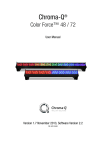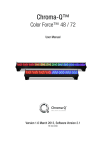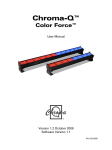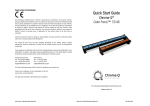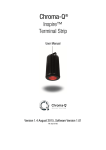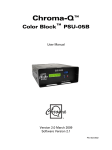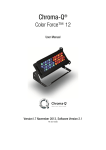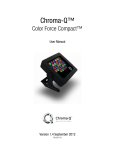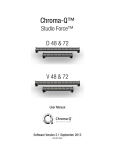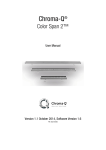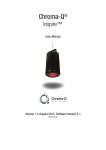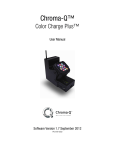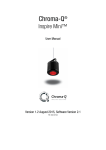Download User Manual
Transcript
Chroma-Q™ Color Force™ 72/48 User Manual October 2011 Software Version 2.0 PN: 622-0500 Disclaimer The information contained herein is offered in good faith and is believed to be accurate. However, because conditions and methods of use of our products are beyond our control, this information should not be used in substitution for customer's tests to ensure that Chroma-Q products are safe, effective, and fully satisfactory for the intended end use. Suggestions of use shall not be taken as inducements to infringe any patent. Chroma-Q sole warranty is that the product will meet the sales specifications in effect at the time of shipment. Your exclusive remedy for breach of such warranty is limited to refund of purchase price or replacement of any product shown to be other than as warranted. Chroma-Q reserves the right to change or make alteration to devices and their functionality without notice due to our on going research and development. The Chroma-Q Color Force has been designed specifically for the lighting industry. Regular maintenance should be performed to ensure that the products perform well in the entertainment environment. If you experience any difficulties with any Chroma-Q products please contact your selling dealer. If your selling dealer is unable to help please contact [email protected]. If the selling dealer is unable to satisfy your servicing needs, please contact the following, for full factory service: Outside North America: Tel: +44 (0)1494 446000 Fax: +44 (0)1494 461024 [email protected] North America: Tel: 416-255-9494 Fax: 416-255-3514 [email protected] For further information please visit the Chroma-Q website at www.chroma-q.com. Chroma-Q and Color Force are www.chroma-q.com/trademarks. trademarks, for more information on this visit The rights and ownership of all trademarks are recognised. Important Notice: As per the requirements in the Occupational Safety and Health Administration standards for product approval, please refer to the OSHA web pages http://www.osha.gov/dts/otpca/nrtl/ for information on the list of Nationally Recognized Testing Laboratories (NRTLs) and the scope of recognition. Color Force User Manual 1 V2.0 October 2011 Table of Contents 1. 2. 3. 4. 5. Product overview..................................................................................................3 Operation...............................................................................................................3 2.1 Unpacking the units...................................................................................3 2.2 Cabling ........................................................................................................3 2.3 Mounting ....................................................................................................4 2.4 Orientation .................................................................................................4 2.5 Cyc & Border Lens......................................................................................4 2.6 Control ........................................................................................................4 2.7 DMX Protocol .............................................................................................8 2.8 Thermal Performance ..................................................................................12 Troubleshooting..................................................................................................12 Specification........................................................................................................13 4.1 Technical specifications ...............................................................................13 4.2 Illuminance measurements ..........................................................................13 4.3 Drawings.......................................................................................................15 Maintenance........................................................................................................16 Color Force User Manual 2 V2.0 October 2011 1. Product overview The Chroma-Q Color Force LED batten range is a brute of a light. At up to 12,000 hot lumens output (Color Force 72); the super bright fixture easily washes up to 8m / 26 foot. In addition, the advanced colour mixing and control management technologies together give you a radically increased colour palette, a high CRI of 92 and theatrical grade dimming, all in the same fixture. Slide-in "Cyc Light" and "Border Light" optical accessories are available to adjust the light output to suit a wide range of applications. The Chroma-Q Color Force lighting fixture is designed specifically for professional indoor entertainment lighting. The fixture can be wall or floor mounted with the adjustable quickrelease end-plate fixing system. For hung bar or truss mounting, additional bar clamp hardware is required. The Color Force features built-in power supplies and can operate as a stand-alone unit or be remotely controlled through ANSI E1.11 USITT DMX 512-A protocol. The Color Force is available in two lengths, the Color Force 72 model which features a total of 288 high powered LEDs (12 x 1000 lumen RGBA cells) and the Color Force 48 model which features a total of 192 high powered LED’s (8 x 1000 lumen RGBA cells). The control options incorporate a choice of HSI (Hue, Saturation and Intensity), RGBA (Red, Green, Blue, Amber), RGB(A) (Red, Green, Blue, with *Magic Amber), RGBI (Red, Green, Blue with *Magic Amber and Intensity) control modes. The Color Force also features a dynamic Variable Effects Engine integrated in the software, which gives the lighting designer full control over colour and effects combinations. The product's robust anodised aluminum extruded construction houses a discreet cable management system. Additional protection is built around the lenses for a truly road proof fixture. 2. Operation 2.1 Unpacking the units The Color Force package includes 1 unit Color Force fixture, power connector (EU)/power cord (US) and a Quick Start Guide. We recommend that you keep the original packaging in case the item needs to be returned. 2.2 Cabling The Color Force utilises PowerCon connectors for power input and through. The DMX control data input and through connections from an external control console are via two XLR 5-pin connectors. The chassis are ground bonded. Note: To avoid overloading the input cable, the maximum length of Color Force fixtures for a single power cable run is 3.6m (12') at 110V or 7.2m (24') at 220V. XLR 5-pin Cable: Pin# Function 1 Ground (Screen) 2 Data Minus 3 Data Plus 4 Spare Data Minus Color Force User Manual 3 V2.0 October 2011 5 Spare Data Plus Power Cable: International Colour Code Green and Yellow Blue Brown North American Colour Code Green White Black Connections Earth (E) Neutral (N) Live (L) Ground (Green) Neutral (Silver) Hot (Gold) Important Notice: The use of an opto-splitter for DMX signal distribution is highly recommended when several fixture units are not plugged into the same power source. 2.3 Mounting The Color Force 72 & 48 fixtures are equipped with built-in mounting brackets for floor, wall and truss mounting applications. The mounting brackets feature a pair of quick release levers for easy tilt adjustment. Note: Secure the fixture with a safety bond. Provision for a fixing hold is built into the brackets. 2.4 Orientation The Color Force 72 & 48 fixtures are built with near/far lenses that optimize the beam spread when used on a wall or cyclorama. The side with near-field lenses is indicated by the narrow edge border, which should be adjacent to the wall or cyclorama. The side with far-field lenses is indicated by the wider edge border, which should be facing away from the wall or cyclorama. Wall or Cyclorama Narrow Wider Audience 2.5 Cyc & Border Lens “Cyc Lens” and “Border Lens” are slide-in optical accessories available to adjust the light output of the Color Force 72 & 48 fixtures to suit a wide range of applications. Two accessory slots are available at the front of the fixture to hold these slide-in Lens. The Cyc Lens is an acrylic panel with 60º x 10º diffusion film. The Border Lens is an acrylic panel with 40º x 40º diffusion film. Matching indentations on both ends of both panels are available for locking. Spring Plungers are pre-installed at the far ends of both accessory slots to lock in-place the slide-in panels. The height of the spring plungers are preset and fixed with no need for further adjustment. 2.6 Control Color Force User Manual 4 V2.0 October 2011 Color Force 72 & 48 fixtures can operate as a stand-alone unit or be controlled remotely by ANSI E1.11 USITT DMX512-A. The control functions of both fixture models are identical and can be accessed through the LCD display at the rear of the fixture with 4 push buttons. Push button operation: Control Exit Up Arrow Down Arrow Back Arrow Function Back to previous menu Increases (+) the mode level or value Decreases (-) the mode level or value (Enter) Stores the menu choice Power-Up Display: On power-up and home position, the display shows the model name ‘ColorForce72’, software version ‘1.6’, the DMX address ‘d002’, current assigned mode ‘RGBA’ and the number of channels the Color Force is in ‘4ch’. Display Mode: The LCD is backlit when you access the menus. This will turn off when left undisturbed for 5 seconds. Control Options: 3 channel HSI (Hue, Saturation and Intensity) gives 2 colour channels for hue and saturation and a separate intensity channel. A separate definable intensity channel is particularly useful when creating intensity chases or when the grand master is used. The hue channel has 255 different colours available and the saturation channel specifies the saturation level of that colour. The saturation channel is fully saturated at full. White is achieved with the intensity channel to full and the saturation channel at zero. 3 channel RGB (Red, Green, Blue with *Magic Amber™) is the more traditional way of controlling colour changing LED fixtures. Each of the three control channels directly affects the intensity of the corresponding LED. Colour is mixed by adjusting the levels of the three primary colours. White is achieved with all channels at full including Magic Amber. 4 channel RGBA (Red, Green, Blue and Amber) gives 4 control channels directly affecting the intensity of the corresponding LED – Red, Green, Blue and Amber. Colour is mixed by adjusting the levels of each of the four colours. White is achieved with all channels at full. 3 channel HSI (Hue, Saturation and Intensity) + 7 effects channels gives 2 colour channels for hue and saturation, separate intensity channel and 7 channels for effects (Grouping, Colour Speed, Fan, Range, Step, Intensity Effects, Intensity Fan). 3 channel HSI + 6 effects channels gives 2 colour channels for hue and saturation, separate intensity channel and 6 effects (Colour Speed, Fan, Range, Step, Intensity Effects, Intensity Fan). 3 channel RGB(A) (with Magic Amber) + 1 intensity channel + 1 effects channel gives three control channels directly affecting the intensity of the corresponding LED – Red, Green, Blue with *Magic Amber, 1 channel affecting the intensity of all RGB(A) channels, and 1 channel for intensity effect. Grouping options: grouping by individual “cell” and “all” cells. A Color Force 72” fixture consists of 12 cells and a Color Force 48” fixture consists of 8 cells. “Cell” grouping allows individual control of each single cell. In “All” grouping, all cells in either the 72” or 48” fixture can be controlled as 1 group. Color Force User Manual 5 V2.0 October 2011 Internal FX engine: mode 1, 5, 6 and 10 incorporate internal FX engine with variable parameters to create an unlimited amount of unique lighting effects. (see 2.5 DMX Protocol for list of parameters) All internal FX are referenced back to the group base HSI colour and intensity levels. *Magic Amber is the term used for the unit's ability to bring in amber when mixing colours that require it. Control Menu Use the push buttons (up/down arrows) to scroll through the control menu positions: Home / DMX Address To set the DMX start address, press Enter, press Up/Down buttons to adjust DMX start address, press Enter for 2 seconds to save the settings. Control Mode The Color Force can be set to operate in 11 DMX controlled modes. 2 grouping options are available (cell-grouped, all-grouped) with 5 control options: fxHSI, HSI, RGB (with Magic Amber), RGBA, RGBI (with Magic Amber), pre-programmed looks and stand-alone effects. Refer to the list below for details. Press Up/Down buttons to access the “Control Mode”, press Up/Down to select the mode and press Enter for 2 seconds to save the settings. Color Force 72 Mode 1 Group Variable Ch 43 2 3 4 5 6 Cell Cell Cell Cell All 36 36 48 49 9 7 8 9 10 11 12 13 All All All All 3 3 4 5 1 Description 7fx + 12 x HSI -or7fx + 12 x RGB(A) with Ch5 @ Full & Ch2 as Intensity Master 12 x HSI 12 x RGB (with *Magic Amber) 12 x RGBA 1s + 12 x RGBI (*Magic Amber) 6fx + HSI -or6fx + RGB(A) with Ch4 @ Full & Ch1 as Intensity Master 1 x HSI 1 x RGB (with *Magic Amber) 1 x RGBA 1s + RGBI (with *Magic Amber) Look Select Master stand-alone Slave stand-alone Color Force 48 Mode 1 Group Variable Ch 31 2 3 4 5 6 Cell Cell Cell Cell All 24 24 32 33 9 7 8 9 10 11 12 All All All All 3 3 4 5 1 Color Force User Manual Description 7fx + 8 x HSI -or7fx + 8 x RGB(A) with Ch5 @ Full & Ch2 as Intensity Master 8 x HSI 8 x RGB (with *Magic Amber) 8 x RGBA 1s + 8 x RGBI (with *Magic Amber) 6fx + HSI -or6fx + RGB(A) with Ch4 @ Full & Ch1 as Intensity Master 1 x HSI 1 x RGB (with *Magic Amber) 1 x RGBA 1s + RGBI (with *Magic Amber) Look Select Master stand-alone 6 V2.0 October 2011 13 Slave stand-alone When DMX is Lost If DMX is not detected various output options can be selected: Press Up/Down to access “When DMX is Lost”, press Enter, press Up/Down buttons to select the setting , press Enter for 2 seconds to save. ‘Off’ - will snap to off ‘Hold’ - will hold the last valid DMX state Look 1-31 will snap to the Look of your choice Look Store The Color Force has 31 internal preset FX Looks for stand-alone operation, 1-23 are pre-programmed. To replay a Look in stand-alone operation, press Up/Down buttons to access “Look Store”, press Enter, press Up/Down buttons to select the desired Look and press Enter for 2 seconds to save settings. To replay a Look with a DMX console, press Up/Down buttons to access Control Mode 11 and press Enter for 2 seconds. Use the DMX console with the assigned channel to playback the various looks stored. (1-31 looks in 1 single channel) Note: DMX has priority over internal Looks. Looks can be recorded to the internal flash memory by users and will be preserved on power down. However, looks will be returned to default setting if Reset is performed. There are two ways to record a look: Simple, with DMX console. Set the Color Force to the desired Control Mode. Use a DMX console to adjust channel levels and create the desired look or effect. Press Up/Down buttons to “Look Store” and press Enter, press Up/Down buttons to the desired Look number and press Enter. Press Enter again for 2 seconds to save Look. Advanced, stand-alone. (DMX is unplugged) Press Up/Down buttons to access “Look Store”, and press Enter, press Up/Down button to the desired Look and press Enter to access the memory data. The data is presented as two numbers separated by a letter “c”. The number to the left of the “c” is the channel number and to the right is the channel level. Pressing Up/Down up to the far end will show the Mode at which the selected Look was programmed. To edit the Mode of a selected Look: Press Up/Down buttons to access “Look Store” and press Enter, press Up/Down to the desired Look and press Enter to access the memory data. Press Up/Down buttons up to the far end until Mode number is shown and press Enter. Press Up/Down buttons to adjust the Mode number. Press Enter to toggle back to the channel numbers. To edit the channel numbers and levels of a selected Look: Press Up/Down buttons to access “Look Store” and press Enter, press Up/Down to the desired Look and press Enter to access the memory data. Press Up/Down buttons and select the channel number. To edit the channel level, press Enter and use the Up/Down buttons to adjust the level (shown as 0-255). Press Enter to toggle back to the channel number. When the desired effect is created press Enter for 2 seconds to save the edited Look. Color Force User Manual 7 V2.0 October 2011 Technical In this mode, frequency settings of the unit can be changed and addressing software for LED engines can be uploaded. Press Up/Down to access “Technical”, press Up/Down to select either “Frequency” or “Upload Engines”. Frequency: The Color Force has four frequency settings available - 600, 1200, 2400 and 4800. This allows for the LED scan rate to be synchronised with the video camera and avoid a flickering effect. Press Up/Down buttons to select the desired frequency, press Enter for 2 seconds to save settings. Upload Engines: Addressing software for LED engines can be uploaded to the Color Force from the Chroma-Q Uploader. 1. Press Enter, Up/Down buttons to select “Upload Engines” then press Enter, and the display will show “Ready”: 2. Connect an XLR 5-pin cable from the Uploader to the unit. 3. Power-up the Uploader - display will show the file name, and ‘Ready’. 4. Press the “GO” button once to execute the uploading - red indicator light on the “GO” button will blink. 5. The Uploader display will show a simulated arrow moving from left to right indicating the uploading process. 6. All the green LEDs of the unit will light up (low intensity) to indicate completion of a successful Upload and the Uploader display will show “DONE”. 7. Power-cycle the unit. (See Quick Start Guide of the Chroma-Q Uploader) Fan Speed The Color Force is built with internal fans with 3 speed settings – “Quiet”, “Studio”, and “Live”. In “Quiet” mode the internal fan is off and light output is reduced by 45%. In “Studio” mode the fan speed is at low velocity and light output is reduced by 15%. In “Live” mode the fan speed at the level of the previous “Version 1.9” at high velocity and the light output at 100%. Press Enter, Up/Down buttons to select “Fan Speed”, then press Enter to select from either “Quiet”, “Studio”, “Live” or “Live with Light”, and then press Enter for 2 seconds to save the settings. Reset to Default Press Up/Down to access “Reset to Default”, press Enter and the display will show “reset?”, press Enter for 2 seconds until the display shows “resetting”, and wait for the display to show “done” and reset is complete with all menu items reset to factory defaults: DMX address = 001, Control Mode = 1 , DMX Lost = Hold, Looks = 00, Fan speed = Live, Frequency = 600, Display = On, 2.7 DMX Protocol Color Force DMX Personality Mode 1. Color Force V2.0 Channel 1 In mode 1 grouping is variable. Mode 1 Color Force 72 (43ch) 7fx + 12 x HSI Color Force 48 (31ch) 7fx + 8 x HSI Grouping 0-100 Variable grouping range between 1-12 cells with FX running within the group. 102-206 Variable grouping range between 112 cells with FX running between the groups. 209-255 Variable interval grouping range for Grouping 0-100 Variable grouping range between 1-8 cells with FX running within the group. 102-206 Variable grouping range between 1-8 cells with FX running between the groups. 209-255 Variable interval grouping range for Color Force User Manual 8 V2.0 October 2011 Channel 2 Channel 3 Channel 4 Channel 5 Channel 6 Channel 7 Channel 8 Channel 9 Channel 10 Channel 11 Channel 12 Channel 13 Total every 2nd to every 12th cells in a group. every 2nd to every 8th cells in a group. Colour Speed 0-255 Variable speed of colour scrolling. From static at 0 to maximum at 255. (Intensity Master when on Mode 7fx + 12 x RGB(A) and Ch5 at Full) Colour Fan 0-255 Variable fan of colour between / within groups. All units are the same colour at 0. Colour Range 0 Full spectrum 1-255 Variable limit of spectrum for colour scrolling. Single colour at 1, full spectrum at 255. Colour Step 0-255 Variable control of smoothness of colour scrolling. Smoothest is at 0. Most coarse is at 250. Rate will vary with scrolling speed. 255 will override effects and switch to RGB. (Mode 7fx + 12 x RGB(A) is activated when this Ch is at Full and Ch2 becomes Master Intensity) Intensity Effects 0 Static 1-63 Fade on, fade off. Variable, 63 fastest 64-127 Fade on, snap off. Variable, 127 the fastest 128-191 Snap on, fade off. Variable, 191 fastest 192-255 Snap on, snap off (strobe). Variable, 255 fastest. Intensity Fan 0-255 Variable fan of intensity effect between / within groups. All units at the same intensity at 0. Alternating units on & off at 255. Hue for group 1 Saturation for group 1 Intensity for group 1 Hue for group 2 Saturation for group 2 Intensity for group 2 ...and so on up to group 12 ...and so on up to group 8 43 DMX channels 31 DMX channels Color Force DMX Personality Mode 2-3 Color Force V2.0 Channel 1 Channel 2 Channel 3 Channel 4 Channel 5 Channel 6 Channel 7 Channel 8 Channel 9 Channel 10 Channel 11 Channel 12 Channel 13 Total In modes 2 & 3 each cell is a group. Mode 2 Color Force 72 (36ch) 12 x HSI Hue for group 1 Saturation for group 1 Intensity for group 1 Hue for group 2 Saturation for group 2 Intensity for group 2 Hue for group 3 Saturation for group 3 Intensity for group 3 Hue for group 4 Saturation for group 4 Intensity for group 4 Hue for group 5 ...and so on up to group 12 36 DMX channels Mode 3 (with Magic Amber) Color Force 48 (24ch) 8 x HSI ...and so on up to group 8 24 DMX channels Color Force 72 (36ch) 12 x RGB Red for group 1 Green for group 1 Blue for group 1 Red for group 2 Green for group 2 Blue for group 2 Red for group 3 Green for group 3 Blue for group 3 Red for group 4 Green for group 4 Blue for group 4 Red for group 5 ...and so on up to group 12 36 DMX channels Color Force 48 (24ch) 8 x RGB ...and so on up to group 8 24 DMX channels Color Force DMX Personality Mode 4-6. Color Force V2.0 Color Force User Manual In modes 4-5 each cell is a group. Mode 4 Mode 5 9 V2.0 October 2011 (with Magic Amber) Channel 1 Channel 2 Channel 3 Channel 4 Channel 5 Channel 6 Channel 7 Channel 8 Channel 9 Channel 10 Channel 11 Channel 12 Channel 13 Total Color Force 72 (48ch) 12 x RGBA Red for group 1 Green for group 1 Blue for group 1 Amber for group 1 Red for group 2 Green for group 2 Blue for group 2 Amber for group 2 Red for group 3 Green for group 3 Blue for group 3 Amber for group 3 Red for group 4 ...and so on up to group 12 48 DMX channels Color Force V2.0 Channel 1 Channel 2 Channel 3 Channel 4 Channel 5 Channel 6 Channel 7 Channel 8 Channel 9 Total Color Force 48 (32ch) 8 x RGBA ...and so on up to group 8 32 DMX channels Color Force 72 Color Force 48 (49ch) (33ch) 1s + 12 x RGBI 1s + 8 x RGBI Intensity Effects 0 Static 1-63 Fade on, fade off. Variable, 63 fastest 64-127 Fade on, snap off. Variable, 127 fastest 128-191 Snap on, fade off. Variable, 191 fastest. 192-255 Snap on, snap off (Strobe). Variable, 255 fastest. Red for group 1 Green for group 1 Blue for group 1 Intensity for group 1 Red for group 2 Green for group 2 Blue for group 2 Intensity for group 2 Red for group 3 Green for group 3 Blue for group 3 Intensity for group 3 ...and so on up to ...and so on up to group 12 group 8 49 DMX channels 33 DMX channels In mode 6 all cells are a group (All) Mode 6 Color Force 72 & 48 (9ch) 6fx + HSI Colour Speed 0-255 Variable speed of colour scrolling. From static at 0 to maximum at 255. (This channel becomes Intensity Master when on Mode 6fx + 12 x RGB(A) and Ch4 at Full) Colour Fan 0-255 Variable fan of colour between groups. All units are the same colour at 0. Colour Range 0 Full spectrum 1-255 Variable limit of spectrum for colour scrolling. Single colour at 1, full spectrum at 255. Colour Step 0-255 Variable control of smoothness of colour scrolling. Smoothest is at 0. Most coarse is at 250. Rate will vary with scrolling speed. 255 will override effects and switch to RGB. (Mode 6fx + 12 x RGB(A) is activated when this Ch is at Full and Ch1 becomes Master Intensity) Intensity Effects 0 Static 1-63 Fade on, fade off. Variable, 63 fastest 64-127 Fade on, snap off. Variable, 127 fastest 128-191 Snap on, fade off. Variable, 191 fastest. 192-255 Snap on, snap off (strobe). Variable, 255 fastest Intensity Fan 0-255 Variable fan of intensity effect between groups. All units at the same intensity at 0. Alternating units on and off at 255. Hue Saturation Intensity 9 DMX channels Color Force User Manual 10 V2.0 October 2011 Color Force DMX Personality Mode 7-9 Color Force V2.0 Mode 7 (3ch) Color Force 72 & 48 HSI In modes 7-9 all cells are a group (All) Mode 8 (3ch) Color Force 72 & 48 RGB Mode 9 (4ch) Color Force 72 & 48 RGBA (with Magic Amber) Channel 1 Channel 2 Channel 3 Channel 4 Total Hue Saturation Intensity Red Green Blue 3 DMX channels 3 DMX channels Red Green Blue Amber 4 DMX channels Color Force DMX Personality Mode 10 Color Force V2.0 In mode 10 all cells are a group (All) Mode 10 (5ch) 1s + RGBI (with Magic Amber) Channel 1 Channel 2 Intensity Effects 0 Static 1-63 Fade on, fade off. Variable range, 63 the fastest 64-127 Fade on, snap off. Variable range, 127 the fastest 128-191 Snap on, fade off. Variable range, 191 the fastest. 192-255 Snap on, snap off (strobe). Variable range, 255 the fastest. Red Channel 3 Green Channel 4 Blue Channel 5 Intensity Total 5 DMX channels Color Force DMX Personality Mode 11 Color Force V2.0 Color Force User Manual Mode 11 (1ch) Look Select 11 V2.0 October 2011 Channel 1 Channel levels and the corresponding Look numbers: Channel Level (%) 0 1–2 3–5 6–9 10–11 12–15 16–19 20–22 23-25 26–27 29-32 33–35 36-38 39-42 43-45 46-48 49-51 52-54 56-58 59-61 62-64 65-68 69-71 72-74 75-78 79-81 83-85 86-88 89-91 92-94 95-97 98-100 Look OFF 1 2 3 4 5 6 7 8 9 10 11 12 13 14 15 16 17 18 19 20 21 22 23 24 25 26 27 28 29 30 31 Description Full Colour Scroll (5 sec) Full Colour Scroll (10 sec) Full Colour Scroll (30 sec) Warm Colour Scroll (5 sec) Warm Colour Scroll (10 sec) Warm Colour Scroll (30 sec) Cold Colour Scroll (5 sec) Cold Colour Scroll (10 sec) Color Colour Scroll (30 sec) Red Full Pink Full Orange Full Light Orange Full Yellow Full Light Yellow Full Green Full Light Green Full Cyan Full Light Cyan Full Blue Full Light Blue Full 3200 White 5600 White Empty Empty Empty Empty Empty Empty Empty Empty 2.8 Thermal Performance The Color Force 72 and Color Force 48 fixtures feature 2 internal fans that drive the internal cooling system. If the internal temperature of the Color Force exceeds 75ºC the output of the fixture is reduced for automatic protection. This happens on rare and extreme conditions when ambient temperature is over 35ºC or the internal fans are blocked or damaged. The airflow to and from the fan must not be constricted to maintain the maximum operating capacity of the Color Force. 3. Troubleshooting Troubleshooting is a process of elimination. First, rule out the other field factors (i.e. bad connections, faulty cables and power supplies). For technical support and/or parts, please contact your selling dealer or the offices listed in this manual. Symptom Fixture does not respond to DMX control. Color Force User Manual Possible Cause Set to wrong or different DMX address. Bad cable connecting DMX control and fixture. 12 Solution Check DMX address and Mode settings. Check/replace DMX run from the console. V2.0 October 2011 Bad in/through connection between adjacent fixtures. Fans are not working. Fan malfunction. Internal temperature is over the limit. Noise from fixture unit. Low LED output. 4. Check fan. Check fan. Check for airflow - to and from the internal fan. Check area ventilation. Specification 4.1 Technical specifications Product Code: Dimensions: Weight: Power input rating: Power connector in/out: Data connectors in/out: Control protocol: Cooling system: Construction: Colour: LED cells: LED per cell: Total LED: Optics: Beam angle: Beam distribution: CCT: CRI: Lamp Life: IP Rating: Operating temperature: Approvals: Color Force 72 Color Force 48 CHCF72NFRGBA CHCF48NFRGBA 1760mm x 180mm x 177mm 1180mm x 180mm x 177mm 69" x 7" x 7" 46.5" x 7" x 7" 22kg / 48lbs 15kgs / 33lbs 100-240VAC, 700VA, 50-60Hz 100-240VAC, 400VA, 50-60Hz PowerCon XLR 5-pin ANSI E1.11 USITT DMX 512-A Forced - 2 fans Anodised aluminium extrusion Black 12 8 24 (6 x RGBA) 24 (6 x RGBA) 288 192 Specialised close focus lens ~ 23º (approx) Symmetrical direct illumination Adjustable 1000 – 10000K 92 Up to 25,000 hours IP20 0ºC to 40ºC CISPR 22:2006/EN55022:2006 & CISPR 24:1997/EN55024:1998 ICES-003:2004 & FCC Part 15 Subpart B:2007 CSA C22. No. 166-M1983:R2008 UL 1573:2003; UL 8750 4.2 Illuminance measurements Color Force 72 Lux and footcandle measurements with RGBA at full intensity: Color Force User Manual 13 V2.0 October 2011 Throw Distance 3' 6.7' 8.75' 10' 12.5' 13.3' 15' LUX FC LUX FC LUX FC LUX FC LUX FC LUX FC LUX FC Center Beam 24000 2230 10700 994 8000 743 6550 609 5050 469 4580 425 4060 377 Beam Width 68" 69" 70" 71" 76" 80" 81" Color Force 48 Lux and footcandle measurements with RGBA at full intensity: Beam Throw Centre Width Distance Beam (in) LUX 23400 46" 3' FC 2174 LUX 10450 48" 6.7' FC 971 LUX 8000 51" 8.75' FC 743 LUX 6600 54" 10' FC 632 LUX 4980 54" 12.5' FC 463 LUX 4600 58" 13.3' FC 427 LUX 3960 58" 15' FC 368 Color Force User Manual 14 V2.0 October 2011 4.3 Drawings Color Force 72 Color Force User Manual 15 V2.0 October 2011 Color Force 48 5. Maintenance With care, the Color Force will require little maintenance. However, as the unit is likely to be used in a stage environment we recommend periodical internal inspection and cleaning of any resulting dust and cracked oil residue. Do not spray liquids on the front or rear panel. If the front enclosure requires cleaning, wipe with a mild detergent on a damp cloth. Color Force User Manual 16 V2.0 October 2011

















